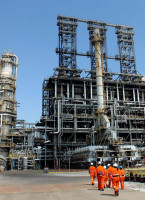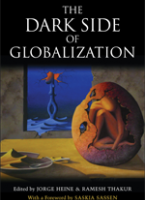Venezuela’s fabric of solidarity has become an individualistic and competitive black market Interview by Hugo Prieto in Contrapunto.com
Regions
Edgardo Lander argues that Venezuela’s once-hopeful revolution is coming to an end, because it failed to overcome the Leninist logic of verticality as well as the model of the rentier state.

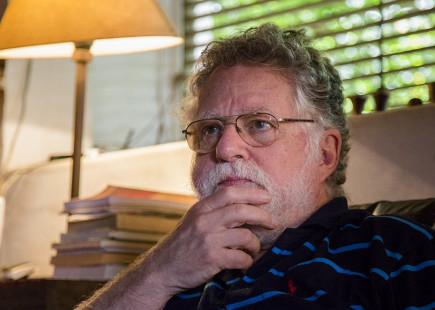
Dagne Cobo, Contrapunto
Looking at a photograph of him it would be very difficult to imagine who Edgardo Lander really is. His look is cold, reflective, but his smile soon melts it. His sense of humour is an effective way to deal with the tensions that questioning Venezuelan society necessarily causes. His spectacles can deflect stares, but not the shutter of the camera. Every time he hears the click, he reacts with a quiet discomfort. I doubt we will ever see him in a jacket and tie, because Lander, a Harvard doctor and Universidad Central de Venezuela sociologist, a participant in ecological debate groups on the Left and a fierce opponent of neoliberalism, is above all a libertarian.
He questions, from his position on the Left, the attempt to legitimise the Bolivarian process based on what already exists whilst at the same time intensifying the rentier- state oil model. When the so-called Bolivarian revolution was proclaimed socialist in 2005, the vertical and Leninist organisation of the communes and communal councils aborted autonomy and participatory democracy, at a time when everything was rojo, rojito [unthinkingly declared socialist]. Authoritarianism, an espirit de corps and the opacity of the military do not fit well in a democracy. The social missions [launched by Chavez] had created a social network but faced with an economic crisis, inflation and shortages, the people’s response was not one of solidarity, but rather one based on individualism and competitiveness.
Electoral logic suffocates political possibilities
Several generations of Venezuelans have been absorbed by the oil rentier state. However, a narrative to overcome this trap did emerge in the 4th (1958-1998) and 5th (1999 to present) Republics. Why has it been so difficult to get rid of this burden?
There are many reasons. The first is that this situation is a century old, which means a century of building a political model, a state, subjectivity and expectations, even the notion of what Venezuela is and who the Venezuelans are, the notion of a rich country. We have oil; we have the right to oil.
This idea is deeply rooted in reality and part of the DNA of Venezuelans. It has been the playing field of political debate and confrontation all this time. Issues such as the overvalued currency, the so-called Dutch disease and the rentier state are well known. It is present in the academia, in political discourse it’s almost obligatory to occasionally refer to these matters. All this is formally acknowledged but in fact, in the short term, the interests of entrepreneurial groups and the party in government led to intensifying the rentier logic.
When politicians mention the issue, they claim they will be removed if they try to change the model.
There is a structural and cultural dimension, but also an electoral one. With regard to the structural dimension, it is very difficult to go against the ‘common sense’ installed in society. In Venezuela, there is a very wide vision of what rights are, but a very limited notion that those rights are only sustainable through collective work and common effort; instead here we have oil and very few responsibilities.
To effectively influence this ‘common sense’ would go against the grain and it would be very difficult to implement without a deep cultural transformation. But getting down to the specifics, public policies are too determined by electoral interests which require attractive electoral programmes. Any important decision, including an increase in the price of petrol, is made considering its impact on the next elections.
Electoral calculations eliminate all possibility of transformation, of going beyond, of imagining a different country, because the starting point is what already exists. In this sense, electoral competition has an extraordinarily conservative effect on political systems, reaffirming ‘common sense’; whoever goes beyond these limits will have big problems.
Inclusion is not sustainable with public spending
It has been said that we now have an environment favourable to a protest vote because there is nothing to share if oil prices fall. Is that sufficient will we see other expectations emerge and a different political thinking?
A protest vote if obviously not enough, in part because in the political debate and collective Venezuelan conscience there is still little awareness as to what is in crisis. Both the political and economic crisis is attributed to the fall in oil prices, as if everything would be buoyant at 100 dollars per barrel.
But as Asdrúbal Baptista says, Venezuela’s per capita oil income has been falling since the 1980s. In other words, we are experiencing a prolonged crisis which is purely and simply the proof that a productive model based on receiving rent and sharing it is unfeasible, which is what we’ve been doing for..
...100 years.
Exactly. One would have thought that in all these years we could have seized the opportunity to overcome the type of state, politics and ‘common sense’ created by oil income, i.e. when Venezuela had abundant resources and an extremely legitimate government, which was the case during a certain period under Chávez, those ‘common senses’ embedded in society could have been challenged, but the underpinning of its legitimacy based on what already existed was preferred.
Instead of striving for transformations in the productive model and the imaginary of what type of society we want and where we are going, the logic of distribution and the idea that democracy and inclusion can be achieved through public spending were promoted. This is obviously not possible.
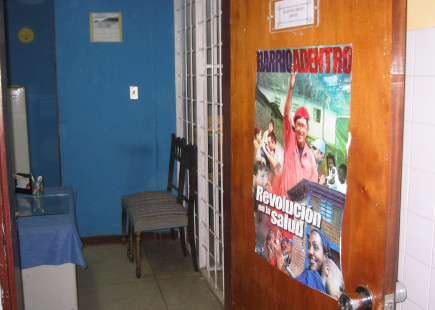
https://www.flickr.com/photos/danconnolly
Because public spending is insufficient?
Public spending as a response to exclusion and deteriorated living conditions caused by neoliberalism is obviously justified, but only as an answer to a difficult situation and as part of a transition to something else. It is obviously much better to transfer income to the population than to contribute to capital concentration as occurred before.
But from the perspective of sustainability over time, from the political and cultural point of view this is not possible, because it reinforces the logic of the rentier-state mentality, as mentioned before, the notion that this is a rich country. But it is also not possible because no matter how much oil income were to grow, it would never be sufficient to satisfy the growing expectations of the population.
We still have a long way to go in this terminal crisis of the rentier-state model and the problem is that we don’t know what the necessarily forced landing will look like. This will not be solved via the government losing parliamentary elections or by a revocatory referendum the following year.
Neither in political debates nor in government programmes is there an acknowledgment of where we are. The two party political forces differ in absolutely everything, except for one small detail: both offer (at least when Chávez was last elected) an oil production of six million barrels a day by the end of this constitutional period. They disagree on everything else except the idea of strengthening the oil rentier-state model. But this is precisely what needs to be discussed. The problem is that there is a nation-wide rentier-state consensus.
Polarization reduces everything to the immediate
You say Venezuela is not aware of exactly what is in crisis. What is the cause of this?
There is an element that cannot be omitted in the current situation. Political polarization has significantly impoverished the capacity of reflection. Everything is black or white, with a kind of filter that transforms everything into government or opposition, leading to an inability to see further than the present situation and what is happening to us as a society.
Do you think polarization has stultified us?
I don’t know if I would call it stultification, but certainly impoverishment of intellectual reflection because polarization reduces the debate to the current, immediate situation. There are no spaces, there have been no spaces in Venezuelan society to reflect beyond day-to-day circumstances concerning what is happening to us as a country. Where have we come from and where are we going? Why do current proposals take into consideration some elements and not others?
At the universities, the situation is dramatic. At the Bolivarian University, instead of discussing how to change society and what the challenges are, there is a tendency to dogmatise the discourse; but it happens in the autonomous universities as well, where a ‘common sense’ of the opposition prevails, so where is the debate? The newspapers and TV have an extremely limited content.
The Universidad Católica Andrés Bello (UCAB) recently made some proposals to the country which was exceptional, but what usually occurs is that all prefer to remain where they feel ideologically comfortable. Isn’t this a tremendously irresponsible attitude?
Dramatically irresponsible, because it’s an issue that doesn’t concern Venezuela alone. We currently face planetary conditions that are remarkably different from those which conformed politics until recently. We must admit that a pattern of civilization that promotes growth destroys the conditions necessary for life on earth and we are dangerously approaching a limit which would undoubtedly produce catastrophic and irreversible changes. Not even the survival of the human species is guaranteed if we persist in this process of destruction, deforestation, greenhouse effect, global warming, depletion of the oceans, etc.
We must acknowledge that we are facing the crisis of a civilization model dominated by capitalism which has become part of our subjectivity. It has been installed as desires, expectations, notions... We understand and live life as material well-being, as increasing abundance. We are living a collective madness, not through ignorance but despite the knowledge and evidence that what we are doing is madness, destructive and unsustainable. Yet we carry on.
The spectre of violence and civil war
The result of the parliamentary elections or a revocatory referendum would not solve the issue of Venezuela’s ‘forced landing’. In 19th century Venezuela, the Montoneras [armed civilian groups] were part of the equation and in the 20th century we witnesed coups. Are we likely to face further violence?
What really worries me is that a state of political violence might be provoked in Venezuela- progressing from the current social violence.Venezuelan society is extremely violent with high homicide statistics. Despite this, from the point of view of political confrontation and apart from episodes such as La Salida (The Exit)3 in 2014, this widespread violence has fortunately not yet escalated into political violence.
But this breakdown could occur. In our society, arms are widely and very ‘democratically’ available, so violent actions and reactions cannot be easily foreseen or controlled. It is a situation beyond the will of the government and opposition leaderships. It is a real threat.
So as at a planetary level we advance in the madness of the destruction of human life, we advance too in our own political madness. Why do we insist in this madness?
I think this has to do again with the short-termism and the polarised way everything is interpreted. All responsibility lies with ‘the others’, the ones on the other side. “We” are peaceful and calm, and the government is repressive and dictatorial or, on the contrary, ‘the others’ are agents of the CIA. The epistemological dimension of polarisation is that knowledge of what is beyond the immediate is blocked. Even things that should be obvious are set aside. This polarised interpretation generates collective blindness. This blindness could cause undesirable acts or situations. I am not saying we are heading towards political violence or a civil war; it should be understood that I do not foresee this. What I am saying is that we are not taking the measures to prevent it.
If the space for electoral confrontation between two contrasting models is no longer there, what should the course of action be? What are the alternatives for the problems facing Venezuelan society?
We must first be aware of the situation we are in. We should think beyond the current context, beyond winning or losing elections; that as a society we are engaged in an extraordinary inertia, which means important issues such as the rentier oil state are not being discussed, only proclaimed. It’s a litany and like all litanies, useless.
In this respect, there are responsibilities, possibilities and options in all areas. I already referred to the need the reclaim the university, for example, the university as the ideal place for collective reflection concerning alternative possibilities for the country. But this in Venezuela has been lost. There is a deep-seated impoverishment of academic production, which is regrettable because mono-ideological intellectual production is futile.
Leninist logic against the social fabric of solidarity
Aren’t universities slaves to free thinking?
They should be. But at the same time there is another field of organisation and search, which is that of the people. The most significant political bet for transformation waged by Chavism was popular power, the commune, communal councils, the mesas técnicas de agua [water boards]. The problem is that this project of popular organization in Venezuela has , since its inception, been embedded with a profound contradiction.
On the one hand, the notion of self-government, the notion of social policies geared to promote the organic social fabric of the popular sectors. The best example is the beginning of Barrio Adentro. If the community does not carry out a census, if it does not identify who the pregnant women are, if it does not establish links to institutions to obtain medicines, what can a single Cuban doctor do? Nothing much.
This role of the community was part of the program from the very beginning. But since the Venezuelan process was declared socialist in 2005, there was the institutionalisation of a more rigid organisation and the notion according to which the state runs and controls everything; in other words, the installation of a Leninist logic of the relations between state and society.
More bureaucratic?
Yes, but I’m talking about the Leninist logic of verticality.
And we know where that leads.
Of course. We are not starting from zero as if history has never existed. In this process of building the social fabric (communes, communal councils, popular power), there is a permanent contradiction between the organisational momentum, which was genuine and had a great impact on a disorganised society subject to the party logic of previous times and generated diverse and rich experiences, yet at the same time dependent on public resources and obeying the Leninist logic, whose caricature are the communal rojo, rojito councils.
If the aim is another democratic model (grassroots, self-organised and plural), popular organisations reflecting the diversity of the people are required.
If this has been the case, participatory democracy doesn’t exist.
Exactly. Participatory democracy is aborted when this logic prevails. What I would like to stress is that in Venezuela this situation has had different consequences throughout the country. There are experiences resulting from genuine popular organisation, which depends on many factors: the specific circumstances of inhabitants, if they have previous political experience, if they observe Chavism from the perspective of a different experience or if, on the contrary, it is their first assembly to discuss collective problems, or the first time a census is carried out to identify priorities and where people might ask “what is autonomy?” or “what is all this about?”
With time, the logic of vertical control became more dominant and a caricature of rojo, rojito communal councils tended to prevail. However, popular experiences have been widespread and are still very active.
Nevertheless, one wonders why the Venezuelan people has reacted as it has to the crisis of the last two years, mainly inflation and scarcity. What happened to the social fabric of solidarity built all these years? The fact is that this social fabric is much more fragile than it seemed to be three years ago, so that the response to the crisis has not been one of solidarity, but of individualism and competitiveness. According to Datanalisis, 70% of the people who queue are bachaqueros [selling products subsidised by the state for profit]
Perhaps those popular experiences could prevent an authoritarian solution. But if the relationship has been that of a Leninist nature and the response to the crisis individualistic and competitive, there may be no political response and people may decide to stay at home.
Who would lead such an authoritarian solution?
Non-governmental political elements or an escalation of the Leninist line, that is, the establishment of a totalitarian state.
I think the possibilities are small. Neither an authoritarian solution resulting from a break with the constitution if the government fears it may lose the elections nor an extra-constitutional solution as was attempted last year – which had nothing to do with the recovery of democracy – are likely.
After periods of extraordinary politicisation, the Venezuelan population is somewhat tired and sceptical. My opinion is that there is no significant support either for the government or any other alternative. I do think that if the polls are correct and the opposition wins the parliamentary elections, there will not be a large popular mobilisation. It will rather be a vote of protest and exhaustion resulting from the difficulties of daily life.
I insist that what really worries me is that beyond of the will of the Partido Socialista Unido de Venezuela and the Mesa de la Unidad Democrática, processes leading to violence may occur, with consequences difficult to control. As December approaches, tensions may arise. Yet, I repeat, I do not foresee on either front any intention to create the conditions for a civil war. But the civil wars of the past were never declared either. This is not how things happen.
Corruption is widespread
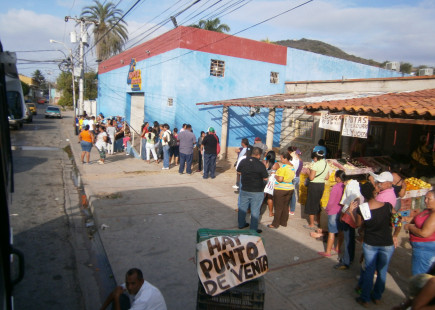
Wikipedia
The larger the crisis, the more visible the corruption. However, there are evident facts (the 20 billion dollars referred to by the ex-minister Giordani). Doesn’t this increase the antipathy towards politics and the desire for real change?
The problem is that this element is very complex and widespread. For example, in the handling of the exchange rates a fundamental component has been private corruption. It cannot be attributed solely to the government. I think it is feasible to say that corruption has been naturalised in Venezuelan society of today, where the limits of what is acceptable and what is not are blurred.
Corruption has permeated many areas of society. The practices of bachaqueo and irregular mineral extraction are forms of corruption, and should not be solely ascribed to organised urban mafias. I have been told that in Barquisimeto, government opponents commented in a queue “we will have to vote for the government because thanks to them there are queues and with the bachaqueo we are making money.” Ethical decomposition is widespread.
The military have a lot to do with corruption, but this is not discussed in Venezuela.
This is an important issue that has to be acknowledged. After the years of Chavism why have we arrived at the present situation? This has much to do with the role played by the military.
Military culture is vertical and authoritarian by definition and contrary to egalitarian, horizontal and participatory democracy. They are two cultural models that are very difficult to reconcile.
Don’t you believe in a civic and military alliance?
I think the way the military has participated massively in public management has permanently obstructed the exercise of democracy, amongst other things because democracy is by nature transparent and military logic opaque.
I think, for example, that the early stages of corruption had to do with the military class, with the peculiarity that the military operate as a body, which makes it much more difficult to condemn, investigate and control; on the other hand, military backing of the government has been too important for the civilians that govern to dare challenge the military. They have become untouchable.
When you observe the smuggling at the border or illegal gold mining in Guayana, you reach the conclusion that they are uncontrollable because the Venezuelan National Guard or other military elements are part of the business. In the state of Bolivar, when a military group is replaced, things change for a few weeks until ways are found to involve them in the corruption mechanisms.
Under these circumstances, the state lacks the instruments to regulate and control these illegal activities because the instruments become part of what should be regulated and controlled. It is essential for the recovery of democracy to remove the military from public management.
Does the Bolivarian process exist or not? Is it exhausted?
In general terms, we can say that after 15 years, the transformative process of Venezuelan society failed because it did not challenge the rentier-state productive model, an indispensable condition for that transformation. If this issue is not addressed, nothing else is possible. It failed because it repeated the logic of the so-called ‘really existing socialism’ according to which society can be changed from the state, by means of reorganisation from top to bottom; but experience has demonstrated this is impossible.
More than impossible it’s a tragedy.
Exactly. It’s a tragic impossibility, but it has its consequences. It is absolutely essential to depart from this twofold trap of either state or market because society is much more than one or the other. Society is a collection of ways of living, a social fabric, institutionalisations, collective practices, and when society is subjected to the logic of vertical organisation by the state or commodification of everything they lead equally to situations where neither life or democracy are feasible.

